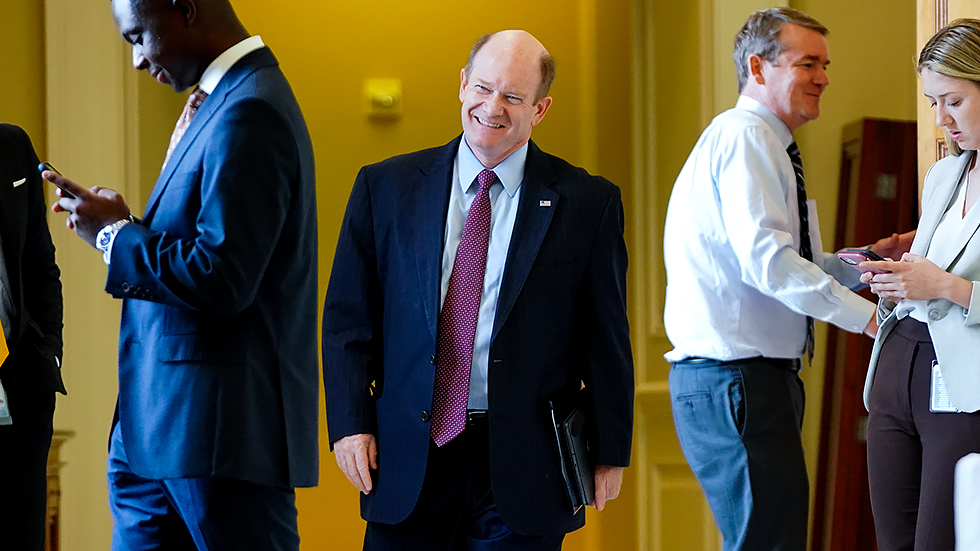Hillicon Valley — Senators unveil social media data-sharing bill
Today is Thursday. Welcome to Hillicon Valley, detailing all you need to know about tech and cyber news from Capitol Hill to Silicon Valley. Subscribe here: digital-staging.thehill.com/newsletter-signup.
Follow The Hill’s cyber reporter, Maggie Miller (@magmill95), and tech team, Chris Mills Rodrigo (@millsrodrigo) and Rebecca Klar (@rebeccaklar_), for more coverage.
Sen. Chris Coons (D-Del.) unveiled a bipartisan bill that would require social media companies share their data with researchers. If companies failed to comply, the proposal would leave open the possibility of stripping tech companies of immunity they have under a controversial provision.
Meanwhile, lawmakers are scrambling to find a Plan B to get cyber incident reporting legislation across the finish line after it was cut from the annual defense bill, and two Senate Democrats are urging the federal government to investigate Facebook.
Let’s jump into the news.
Hand over the data

Meta and other social media companies would be required to share their data with outside researchers under a new bill announced by a bipartisan group of senators on Thursday.
Who’s on board: Sens. Chris Coons (D-Del.), Amy Klobuchar (D-Minn.) and Rob Portman (R-Ohio) underscored the need for their bill based on information leaked about Meta’s platforms in the so-called Facebook Papers, though the proposal would also apply to other social media companies.
The bill, the Platform Accountability and Transparency Act, would allow independent researchers to submit proposals to the National Science Foundation. If the requests are approved, social media companies would be required to provide the necessary data subject to certain privacy protections.
“It’s increasingly clear that more transparency is needed so that the billions of people who use Facebook, Twitter, and similar platforms can fully understand the impact of those tradeoffs. This bipartisan proposal is an important step that will bring much needed information about the impact of social media companies to light and ought to be a crucial part of any comprehensive strategy that Congress can take to regulate major social media companies,” Coons said in a statement.
Potential consequences: If companies failed to comply with the requirement under the bill, they would be subject to enforcement from the Federal Trade Commission (FTC) and face losing immunity under Section 230 of the Communications Decency Act. Section 230 is a controversial provision that provides immunity for internet companies based on content posted by third parties, and lawmakers on both sides of the aisle have proposed measures to weaken its reach.
A MESSAGE FROM CONNECTED COMMERCE COUNCIL
Congress is considering sweeping antitrust legislation that could hurt the digital economy – and put small businesses at risk. Learn more at connectedcouncil.org
Next steps on cyber incident reporting

Lawmakers are scrambling to find another avenue to pass a key bipartisan cybersecurity proposal after an eleventh-hour deal scuttled its inclusion in the annual defense policy bill.
The proposal was touted as the centerpiece of Congress’s response to a series of major cyberattacks over the past year.
The plan to include a clause in the National Defense Authorization Act (NDAA) mandating that critical infrastructure groups and other key organizations report major cyberattacks to the federal government in a set time frame saw widespread support in both the House and Senate.
Fly in the ointment: After last-minute objections from a set of key Senate Republicans slowed down negotiations, the language slipped out of the defense package, leaving members of Congress on both sides of the aisle deeply frustrated and mulling next steps.
“I think it’s a shame and I don’t really understand it. Everybody has told us how important this is; this was an opportunity. Apparently one or two senators blocked it for reasons that aren’t clear to me. It’s a compromise of national security,” Sen. Angus King (I-Maine), the co-chair of the Cyberspace Solarium Commission and a member of the Senate Intelligence Committee, told The Hill Wednesday.
“Now we’re going to have to just figure out how to do it another way,” King said.
Officials press for passage: Senate Intelligence Committee Chairman Mark Warner (D-Va.) told reporters that FBI Director Christopher Wray had been among those pushing for incident reporting to become law.
FACEBOOK UNDER FIRE
Democratic Sens. Elizabeth Warren (Mass.) and Maria Cantwell (Wash.) are urging federal agencies to investigate whether Facebook misled advertisers by misrepresenting the reach of ads.
Warren sent letters to the Securities and Exchange Commission (SEC) and Department of Justice (DOJ) Thursday, following a similar letter Cantwell sent to the Federal Trade Commission (FTC) on Wednesday.
The senators’ letters build off the allegations laid out by Facebook whistleblower Frances Haugen in her complaints to the SEC.
“Facebook is not above the law. The company’s executives cannot mislead investors, the SEC, its advertising customers, and the public about a core metric of its business model with impunity if such actions violate federal wire fraud or securities laws,” Warren wrote. “Given the allegations of such misconduct, I urge the DOJ and SEC to immediately commence investigations into Facebook’s representations with respect to Potential Reach and, if you find that the company has in fact violated wire fraud or securities laws, to pursue all available criminal and civil sanctions as appropriate.”
Cantwell wrote to the FTC with a similar request, asking the agency to “immediately commence an investigation.”
AMAZ(ON)ING FINE
Italy’s antitrust regulator on Thursday fined Amazon a record $1.3 billion for illegally maintaining a dominant position in the e-commerce logistics market.
The Italian Competition Authority, or AGCM, said in a statement that Amazon had leveraged its market position to encourage Italian sellers to use its in-house delivery service, Fulfillment by Amazon (FBA).
That pressure was applied “to the detriment of the logistics services offered by competing operators, as well as to strengthen its own dominant position,” the regulator said.
Amazon blocked third-party vendors from selling through the Prime loyalty program and excluded them from special events like Cyber Monday unless they used FBA, according to a press release on the fine.
“The investigation showed that such benefits are crucial to gain visibility, to boost sales and, in turn, to the success of the sellers’ offers on Amazon.it,” the regulator said.
Instagram makes a change

Instagram will offer users the option to view their feeds in chronological order again next year, the social media app’s chief Adam Mosseri told lawmakers Wednesday.
“We believe in more transparency and accountability and we believe in more control. That’s why we’re currently working on a version of a chronological feed that we hope to launch next year,” he said.
Instagram first introduced its algorithmically sorted feed in 2016 before updating it in 2017 to also include recommended posts from accounts that users do not follow.
Mosseri’s reveal of the return of the chronological feed came during questioning about concerns that algorithms are directing users, especially young girls, to content that ultimately harms their mental and physical health.
A MESSAGE FROM CONNECTED COMMERCE COUNCIL
Congress is considering sweeping antitrust legislation that could hurt the digital economy – and put small businesses at risk. Learn more at connectedcouncil.org
LOOK, NO HANDS
Daimler AG’s Mercedes Benz has won approval to deploy a hands-free driving system in Germany, Bloomberg News reported.
The company reported Thursday that it will be able to sell its Drive Pilot package for use on stretches on Germany’s Autobahn network, which will clock in at a speed of up to 37 miles per hour.
The Drive Pilot system was approved for Level 3 autonomous driving, a level higher than Tesla Inc.’s Level 2 Autopilot system.
Mercedes Benz’s new system will also allow drivers to drive without using the vehicle steering wheel in slow-moving traffic, according to Bloomberg News.
BITS AND PIECES
An op-ed to chew on: Left and right take aim at Big Tech–and the First Amendment
Lighter click: Titan in the… tech industry?
Notable links from around the web:
Elizabeth Holmes Was Always In Control (The Verge / Elizabeth Lopatto)
How political advertisers skirted Facebook’s rules in 2020 — and got away with it (Protocol / Issie Lapowsky)
Birds Aren’t Real, or Are They? Inside a Gen Z Conspiracy Theory. (The New York Times / Taylor Lorenz)
The Myth of Artificial Intelligence (The American Prospect / Meredith Whiattaker and Lucy Suchman)
One last thing: Google showing the money

Google said it will distribute one-time bonuses of $1,600 to employees this month amid the tech giant’s decision to postpone a plan to return to the office, according to Reuters.
A Google spokesperson told the newswire the bonuses will be given to the company’s extended workforce and interns as well.
The spokesperson for Google told the news source that the bonus is in addition to the company’s work-from-home allowance and well-being bonuses to aid in the difficult time during a pandemic that has lasted almost two years.
A survey conducted by the company in March had shown a drop in well-being among its workers, prompting Google to announced a series of benefits including a $500 cash bonus.
That’s it for today, thanks for reading. Check out The Hill’s technology and cybersecurity pages for the latest news and coverage. We’ll see you Friday.
{mosads}
Copyright 2024 Nexstar Media Inc. All rights reserved. This material may not be published, broadcast, rewritten, or redistributed..














